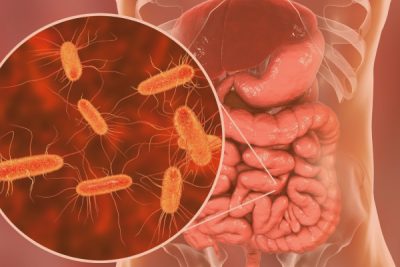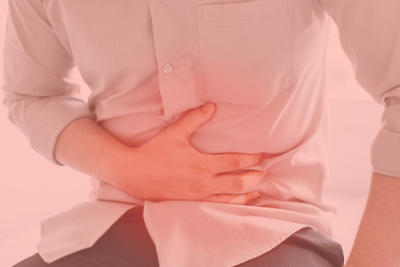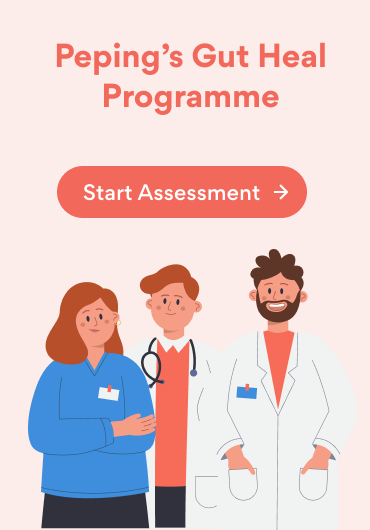In times of stress, your eyes dilate to see more, your skin may be flushed and sweaty, your mouth becomes dry, you may feel tired and unable to concentrate, you may feel nauseated, breathing may become fast and shallow, and blood pressure and heartbeats may increase!
Chronic stress is associated with various health concerns, including cardiovascular diseases, immune system dysfunction, and mental disorders.
But, can stress disrupt gut health and alter its composition? Let’s find out.
The gut microbiome refers to the large collection of microorganisms including bacteria, viruses, and fungi, that reside in the gut. The gut microbiome plays a vital role in maintaining overall health.
Studies have reported that increased levels of psychological stress can lead to/aggravate digestive symptoms such as nausea, diarrhea, constipation, abdominal pain, bloating, indigestion, and heartburn. Stress may also lead to gastrointestinal (GI) disorders such as irritable bowel syndrome (IBS), inflammatory bowel disease (IBD), and gastroesophageal reflux disease (GERD).
The Gut-Brain Axis
- The gut-brain axis/connection is a bi-directional communication system that links the central nervous system (CNS) to the enteric nervous system (ENS), which is responsible for the functions of the gastrointestinal tract (GIT). The brain and the gut (“second brain”) communicate through the vagus nerve.
- The connection allows the brain and the gut to influence each other’s activities, and it plays a crucial role in regulating various bodily processes.
- A healthy gut produces 90 to 95% of the neurotransmitters required for mood, motivation, concentration, and energy. Tweaking the balance of gut bacteria can alter brain chemistry, increasing anxiety and/or depression.
- Norepinephrine, dopamine, and serotonin regulate mood, blood flow, gut motility, nutrient absorption, the immune system, and the gut microbiome.
- Gut bacteria such as Bifidobacterium, Lactobacillus, Bacillus, Escherichia coli, Saccharomyces, Streptococcus, Enterococcus, and Serratia species are necessary to produce gamma-aminobutyric acid (GABA), norepinephrine, serotonin, and dopamine.
Impact of stress on the gut microbiome
- Stress can disrupt the gut microbiome, leading to changes in gut composition. Stress can cause gut dysbiosis (microbial imbalance), increase the abundance of harmful bacteria, and decrease the abundance of beneficial bacteria.
- Stress can affect the intestinal mucosal barrier, increase gut permeability, referred to as the “leaky gut”, and alter intestinal motility, and the immune system. Effects of leaky gut in the human body include increased anxiety and/or depression, constipation, diarrhea, fatigue, headaches, frequent colds, food sensitivities, hypothyroidism, dermatological issues (such as acne, rosacea, eczema, psoriasis), and musculoskeletal disorders (rheumatoid arthritis, fibromyalgia).
- Chronic stress can reduce microbial diversity with increased alpha diversity over time.
- The microbial community in the gut can be disturbed by stress, impacting their ability to metabolize dietary compounds, and altering their competitive dynamics, reducing nutrient absorption.
- Chronic restraint stress increases the abundance of Proteobacteria, Bacteroidetes, and Clostridium species in the gut microbiome while decreasing Firmicutes family and genera, with a resultant reduced Firmicutes/Bacteroidetes ratio
- Good bacteria that produce short-chain fatty acids (SCFAs) such as butyrate become less numerous in the gut as a result of stress, and deteriorating gut health.
Mechanisms underlying the effects of stress on the gut
- The gut microbiota can influence the gut-brain axis, affecting emotional behavior, stress response, and neurotransmitter systems. In particular, stress can affect the release of GABA and serotonin, which can impact gut motility and the growth of particular gut bacteria.
- Stress can lead to changes in the gut bacteria composition through stress hormones (cortisol) and autonomic alterations.
- Psychological stress promotes colonic inflammation by weakening immune defenses, allowing harmful bacteria to thrive, and triggering the secretion of pro-inflammatory cytokines such as interleukin-17A from helper T cells of the immune system.
- Psychological stress reduces levels of tight junction proteins in the intestine and increases gut permeability.
- Stress can lead to reduced gastrointestinal mucus, reduced blood flow to the intestines, increased food allergies, and altered intestinal secretions.
Ways to improve gut health
- Practicing yoga, meditation, deep breathing, and mindfulness (such as cognitive behavioral therapy) can reduce stress levels and positively impact gut health.
- Physical exercise is known to reduce stress and promote a diverse gut microbiome. Regular exercise can improve mental health symptoms such as anxiety and depression.
- Your diet affects every aspect of your health, including your mental health. Consuming a nutrient-dense and diverse diet rich in fiber can support a healthy gut, even during periods of stress.
- Increased intake of ultra-processed foods and added sugars have been associated with increased stress levels. Eat more whole foods such as fruits vegetables, beans, fish, nuts, and seeds.
- Artichokes, apples, almonds, blueberries, and pistachios increase Bifidobacteria counts in humans. Bifidobacteria are good bacteria since they can help prevent intestinal inflammation and enhance gut health.
- Consume more probiotics, sources include yogurt, kimchi, sauerkraut, kefir, kombucha, and tempeh. These foods are rich in lactobacilli, a bacteria that can benefit your gut health. These people also have less Enterobacteriaceae, which is a type of bacteria associated with gut inflammation. Probiotics help improve cognitive performance after stress by modulating gut microbial composition, reducing cortisol levels, and increasing GABA levels. In particular, an increase in Ruminococcaceae_UCG-003 abundance has been associated with improved cognitive performance under stress.
- Eat pre-biotic-rich foods. Prebiotics are foods that promote the growth of beneficial bacteria in the gut.
- Prioritize sleep to help your body recover from stress and maintain a healthy gut.
- Practice self-care. Habits such as reading a book, lighting candles, journaling, spending time outdoors, practicing a hobby, getting a massage, spending time with pets, and using diffusers with relaxing scents (such as (lavender, vetiver, rose, Roman chamomile, bergamot, frankincense, neroli, ylang-ylang, sandalwood, geranium, and orange or orange blossom) may help reduce stress levels.
- Consult a mental health professional if you’re dealing with chronic stress or anxiety.
- Limit alcohol and caffeine intake, quit smoking
- Consume antibiotics when necessary, as indicated by health professionals
- Minimize smartphone use and screen time. Studies have associated excessive smartphone use with increased stress levels and mental health disorders. Screen time may also affect sleep, leading to increased stress levels.
Final thoughts
You may feel anxious and depressed, and despite trying medications such as anti-depressants, and therapies, and attending counseling sessions, the situation may not improve considerably. You may even begin to experience digestive issues such as bloating and constipation! The culprit may be an unhealthy gut.
There is an intricate relationship between mental well-being and the composition of the gut. While the brain influences microbial balance, intestinal motility and secretion, nutrient delivery, and bowel movements, the gut affects neurotransmitter levels, altering behavior, and mood, and increasing anxiety.
Stress can impact the composition as well as the diversity of the gut microbiome, potentially affecting digestion, metabolism, and overall health. By managing stress effectively through lifestyle changes and seeking support when required, one can promote a healthier gut, a healthier mind, and a body overall.
A healthy gut absorbs nutrients to support brain health and prevents bacteria and inflammation causing agents associated with the development of depression to “leak” into the bloodstream.
A healthy gut is a happy brain













